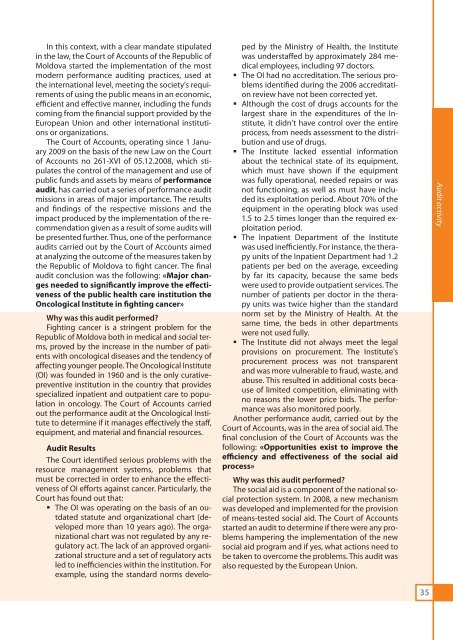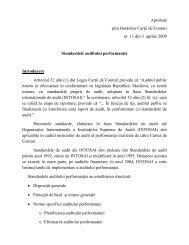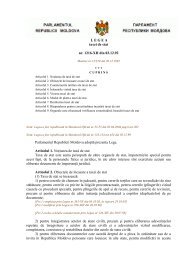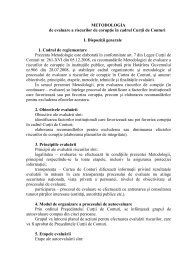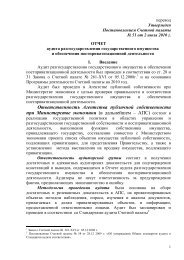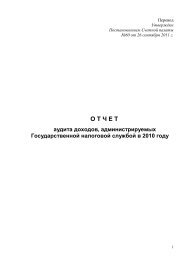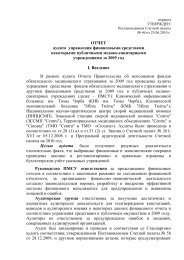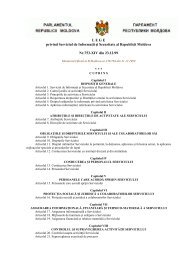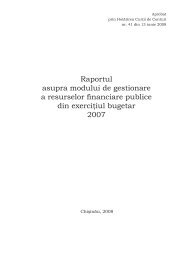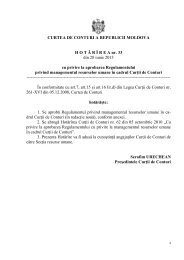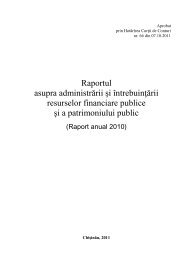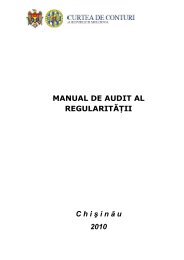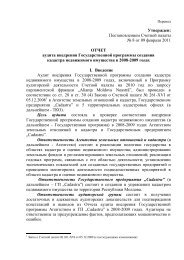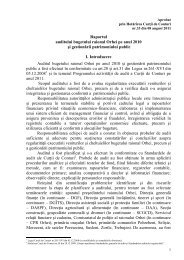Buletin 3_4-2010 web.pdf - Curtea de Conturi a Republicii Moldova
Buletin 3_4-2010 web.pdf - Curtea de Conturi a Republicii Moldova
Buletin 3_4-2010 web.pdf - Curtea de Conturi a Republicii Moldova
Create successful ePaper yourself
Turn your PDF publications into a flip-book with our unique Google optimized e-Paper software.
In this context, with a clear mandate stipulated<br />
in the law, the Court of Accounts of the Republic of<br />
<strong>Moldova</strong> started the implementation of the most<br />
mo<strong>de</strong>rn performance auditing practices, used at<br />
the international level, meeting the society's requirements<br />
of using the public means in an economic,<br />
efficient and effective manner, including the funds<br />
coming from the financial support provi<strong>de</strong>d by the<br />
European Union and other international institutions<br />
or organizations .<br />
The Court of Accounts, operating since 1 January<br />
2009 on the basis of the new Law on the Court<br />
of Accounts no 261-XVI of 05 .12 .2008, which stipulates<br />
the control of the management and use of<br />
public funds and assets by means of performance<br />
audit, has carried out a series of performance audit<br />
missions in areas of major importance . The results<br />
and findings of the respective missions and the<br />
impact produced by the implementation of the recommendation<br />
given as a result of some audits will<br />
be presented further . Thus, one of the performance<br />
audits carried out by the Court of Accounts aimed<br />
at analyzing the outcome of the measures taken by<br />
the Republic of <strong>Moldova</strong> to fight cancer . The final<br />
audit conclusion was the following: «major changes<br />
nee<strong>de</strong>d to significantly improve the effectiveness<br />
of the public health care institution the<br />
oncological Institute in fighting cancer»<br />
Why was this audit performed?<br />
Fighting cancer is a stringent problem for the<br />
Republic of <strong>Moldova</strong> both in medical and social terms,<br />
proved by the increase in the number of patients<br />
with oncological diseases and the ten<strong>de</strong>ncy of<br />
affecting younger people . The Oncological Institute<br />
(OI) was foun<strong>de</strong>d in 1960 and is the only curativepreventive<br />
institution in the country that provi<strong>de</strong>s<br />
specialized inpatient and outpatient care to population<br />
in oncology . The Court of Accounts carried<br />
out the performance audit at the Oncological Institute<br />
to <strong>de</strong>termine if it manages effectively the staff,<br />
equipment, and material and financial resources .<br />
audit results<br />
The Court i<strong>de</strong>ntified serious problems with the<br />
resource management systems, problems that<br />
must be corrected in or<strong>de</strong>r to enhance the effectiveness<br />
of OI efforts against cancer . Particularly, the<br />
Court has found out that:<br />
The OI was operating on the basis of an outdated<br />
statute and organizational chart (<strong>de</strong>veloped<br />
more than 10 years ago) . The organizational<br />
chart was not regulated by any regulatory<br />
act . The lack of an approved organizational<br />
structure and a set of regulatory acts<br />
led to inefficiencies within the institution . For<br />
example, using the standard norms <strong>de</strong>velo-<br />
ped by the Ministry of Health, the Institute<br />
was un<strong>de</strong>rstaffed by approximately 284 medical<br />
employees, including 97 doctors .<br />
The OI had no accreditation . The serious problems<br />
i<strong>de</strong>ntified during the 2006 accreditation<br />
review have not been corrected yet .<br />
Although the cost of drugs accounts for the<br />
largest share in the expenditures of the Institute,<br />
it didn't have control over the entire<br />
process, from needs assessment to the distribution<br />
and use of drugs .<br />
The Institute lacked essential information<br />
about the technical state of its equipment,<br />
which must have shown if the equipment<br />
was fully operational, nee<strong>de</strong>d repairs or was<br />
not functioning, as well as must have inclu<strong>de</strong>d<br />
its exploitation period . About 70% of the<br />
equipment in the operating block was used<br />
1 .5 to 2 .5 times longer than the required exploitation<br />
period .<br />
The Inpatient Department of the Institute<br />
was used inefficiently . For instance, the therapy<br />
units of the Inpatient Department had 1 .2<br />
patients per bed on the average, exceeding<br />
by far its capacity, because the same beds<br />
were used to provi<strong>de</strong> outpatient services . The<br />
number of patients per doctor in the therapy<br />
units was twice higher than the standard<br />
norm set by the Ministry of Health . At the<br />
same time, the beds in other <strong>de</strong>partments<br />
were not used fully .<br />
The Institute did not always meet the legal<br />
provisions on procurement . The Institute's<br />
procurement process was not transparent<br />
and was more vulnerable to fraud, waste, and<br />
abuse . This resulted in additional costs because<br />
of limited competition, eliminating with<br />
no reasons the lower price bids . The performance<br />
was also monitored poorly .<br />
Another performance audit, carried out by the<br />
Court of Accounts, was in the area of social aid . The<br />
final conclusion of the Court of Accounts was the<br />
following: «opportunities exist to improve the<br />
efficiency and effectiveness of the social aid<br />
process»<br />
Why was this audit performed?<br />
The social aid is a component of the national social<br />
protection system . In 2008, a new mechanism<br />
was <strong>de</strong>veloped and implemented for the provision<br />
of means-tested social aid . The Court of Accounts<br />
started an audit to <strong>de</strong>termine if there were any problems<br />
hampering the implementation of the new<br />
social aid program and if yes, what actions need to<br />
be taken to overcome the problems . This audit was<br />
also requested by the European Union .<br />
35<br />
Audit activity


